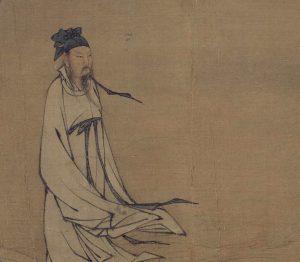
The Buddhist teaching about living in the present moment is sometimes misconstrued as a lackadaisical attitude that lets the past go too easily or fails to plan for the future. Some have criticized this counsel for being too laid back or detached from worldly affairs. Some may even conclude that Buddhism is an impractical philosophy or too disengaged from the real world. Yet a deeper understanding reveales that, on the contrary, Buddhist discussions on the present moment are deeply engaged, insightful, and sophisticated.
As Zen teacher Thich Nhat Hahn explores in his book Present Moment, Wonderful Moment (1990), we are a lot more connected with our sensory experiences, perceptions, and thought processes when we are focused on the present moment. Some might wonder if this could also intensify our bad and unpleasant experiences. Buddhism’s point is that we should not be focusing on negative experiences if the triggering causes and conditions lie in the past. We would only be reliving them in our mind. The past is gone and we have a choice as to what to focus on in our present. Of course, we still have to bear the adverse consequences of our poor decisions in the past, but these consequences arise in the present moment, and attending to them correctly will shape the consequences in the future.
Imagine that you overspent on your credit card last year, thinking that the purchases would bring you joy. The excitement usually does not last too long, but the debt still needs to be repaid. In this situation, we would find ourselves in debt and suffering from the lack of money to enjoy ourselves, feeling stress from owing the debt, and lacking the resources to benefit others. Any reasonable financial adviser would suggest cutting our spending and perhaps working harder or smarter. Your adviser might review your spending habits and identify new income sources. It would be quite odd if your adviser urged you to do nothing, or to just look at the bill without changing your behavior or mindset.
If the Buddha were living in our modern, capitalistic society, he could have been a great financial adviser. However, in the Ugga Sutta of the Aṅguttara Nikāya, the Buddha proclaims that our spiritual and moral resources are what form life’s real wealth. (AN 7.6 and AN 7.7) These riches are sevenfold: faith, virtuous behavior, learning, generosity, wisdom, moral shame, and moral dread. The cultivation of these seven moral values endows one with resources for a worthy life, while a lack of them renders one indebted and poor. For those who are morally poor or indebted, the Buddha suggests the accumulation of these seven factors of wealth through proper reflection, accompanied by changes in thought and action. We should not allow ourselves to be dragged down by our debt by doing nothing.
In the Sacitta Sutta (AN 10.51), the Buddha taught that we can achieve this kind of self-reflection through conceptualizing our self-examination as looking at our own blemishes in the mirror. We might not be very observant of other people’s blemishes or their moral deficiencies, but we should be very observant in recognizing our own. Thich Nhat Hanh also highlights this, noting: “The moments during the day of looking at a mirror can be moments of deep awareness.” (Thich Nhat Hanh 1990, 7)
It is not simply about how morally “rich” or “poor” we are, but about reflecting on the moral predicaments in our everyday lives. How can each of us can live a moral life despite our challenging, complex environment? We need the moral “luck,” and the right conditions to make the right choices. Additionally, we are responsible for our moral decisions as much as we are responsible for our own happiness.
The seventh month of the Chinese lunar calendar is the Ghost Festival. This period actually marks the end of the Buddhist rains retreat on 15 July. On this day, monastics will engage in deep introspection with one another to conclude their 90-day retreat practice. They enter into self-reflection and repentance in front of a harmonious community of practitioners. This reflection is achieved through turning inward instead of accusing others. It is accordingly called the day of pavāranā, a day of joy, offerings, and growing in practice together.
In a recent sharing, I argued that people are often attached to the past and future without truly appreciating the value and significance of time by being “presently present.” In a similar way, we are often more interested in our attachments to “right” or “wrong” views without being “moral” and “wise.” We may focus on the difference between “for profit” or “not-for-profit” without being truly kind and caring.
I believe that we should transcend these polarized views, hence the cultivation of the right view of dependent arising, non-self, and impermanence. We should engage in everyday practice, be kind, and see deeply our errors in the mirror.
References
Thich Nhat Hanh. 1990. Present Moment, Wonderful Moment: Mindfulness Verses for Daily Living. Delhi: Full Circle.
Bodhi, Bhikkhu (trans.). 2013. “Ugga Sutta: To Ugga” (AN 7.7). Access to Insight (BCBS Edition). 30 November 2013. Accessed at: http://www.accesstoinsight.org/tipitaka/an/an07/an07.007.than.html.
Thanissaro, Bhikkhu (trans.). 2013. “Dhana Sutta: Treasure” (AN 7.6). Access to Insight (BCBS Edition). 30 November 2013. Accessed at: http://www.accesstoinsight.org/tipitaka/an/an07/an07.006.than.html.
Thanissaro, Bhikkhu (trans.). 2013. “Sacitta Sutta: One’s Own Mind” (AN 10.51). Access to Insight (BCBS Edition). 30 November 2013. Accessed at: http://www.accesstoinsight.org/tipitaka/an/an10/an10.051.than.html.
Related features from Buddhistdoor Global
Mindful Expression: Immersion in the Essence of the Moment
Karma and Free Will
Ethics: The Necessary Basis for Mindfulness











